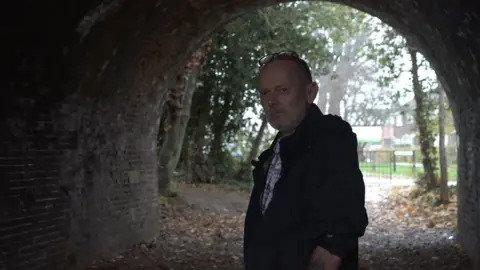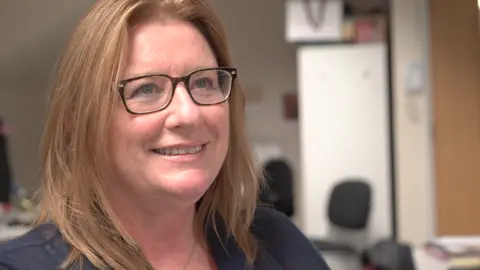'I would have died without Help to Rent'
For Steve, homelessness started when his relationship broke down.
He moved into shared accommodation and after going into hospital with pneumonia he came home to find the landlord changing the locks.
Soon he was on the streets.
"People think if you're homeless you must be some kind of addict or a bad person," he says. "But it takes such a little spark to cause the fire of homelessness. And trying to find help is actually quite hard because it's not that well signposted."
Councils have a legal duty to help families, pregnant women and other vulnerable people who find themselves homeless. But as a single man Steve did not qualify as "priority need" and the private rented sector was the most viable option.

But renting in the private sector is expensive.
With most landlords requiring a deposit, a month's rent in advance and agency fees of up to £350 the costs add up.
Research by homelessness charity Crisis found these upfront costs can range from around £900 for shared accommodation in Yorkshire to over £2,000 for a one-bed flat in London.
This would be a significant amount for anyone, but for someone who is homeless it can be an insurmountable barrier.
This is on top of the fact that most landlords are unwilling to rent to someone on benefits, let alone someone who is homeless - research by Crisis found only 20% of landlords would be willing to let to homeless people.
Eventually Steve was put in touch with a charity in Elmbridge, Surrey, an area he knew.
Elmbridge is in Chancellor Philip Hammond's constituency and is one of the most expensive postcodes in the country. Rents and therefore deposits are very high.
Owning virtually nothing except for a few clothes, Steve had little hope of getting the money together for a deposit to rent.
Elmbridge Rentstart helped him find a suitable home and provided a six month bond on his deposit, as well as paying the first month's rent.
Instead of a cash deposit the charity provides a guarantee to the landlord to cover any damage to the property or unpaid rent, removing the financial risk.
If there is any damage to the property at the end of a tenancy the charity either tries to rectify the issue using volunteers, for example through redecorating, or will pay the landlord directly.
However, they found with the right support deposit deductions tend to be low.
Long-term solution
Rentstart also provided support to help Steve understand the process and the benefits he was entitled to.
"Without Rentstart's help I would probably have been dead," he said.
"I wouldn't have known where to start looking for benefits. I wouldn't have even known benefits were available. I would have been on the streets in the winter and I probably wouldn't have seen the winter through."
The scheme aims to find a long-term solution, matching tenants to suitable homes and providing ongoing support.
"I've been living here for four years. And it's because they did their research," he explains.
"They didn't just say 'well you're homeless, you're going here'. I knew the area, I knew the people and I knew where to look for work. I had connections."

Ahead of the Budget, Crisis is calling for the government to fund more Help to Rent schemes like the one in Elmbridge and a national rent deposit scheme.
This would provide a commitment from the government to guarantee a deposit for tenants who can't afford to pay one upfront.
A spokesperson for the Department for Communities and Local Government said it was investing £950m up to 2020 to reduce homelessness and a further £2bn in affordable housing.
But Helen Watson, Chief Executive of Elmbridge Rentstart, said a government-funded rent deposit scheme would make a huge difference to organisations like hers.
"It would mean the really limited resources we have to hold to have our own bond scheme would be freed up to house more people in other ways," she says.
The Westminster Policy Institute estimated funding the scheme would cost £31m a year. But Crisis says the long-term annual savings could be up to £595m, by taking pressure off local authority services and preventing people becoming homeless, allowing them to move off benefits and back into work.
The Homelessness Reduction Act, which comes into force next year, places extra responsibilities on councils to prevent homelessness. Crisis says Help to Rent would help homeless people into the private rented sector, taking the pressure of councils.
Immediate help
Helen Watson acknowledges the need for more social housing but says the private rented sector could also offer solutions.
"With the private rented sector you can pick where you want to live. So if you've got problems in a particular area because the network's not good and you're trying to recover from a drug or alcohol problem, somewhere else, perhaps where you can find work, is a really good solution," she says.
"Of course we need more social housing but the private rented sector is a good solution when it's properly managed by the right sort of organisation."
Tom Say, a senior campaigns officer at Crisis, agrees.
"We absolutely need to build more social housing but that's a long term goal. It will take years to build that new housing to get the stock we need," he said.
"There are homeless people that need help right now and this is a quick way for the government to help those people."
Steve now works for Elmbridge Rentstart himself, spending his evenings locating homeless people in the area who might be in need of help. He says the Help to Rent scheme changed his life.
"Without the support and guidance it gave me, I'd be worse off than the guys I go out and help."